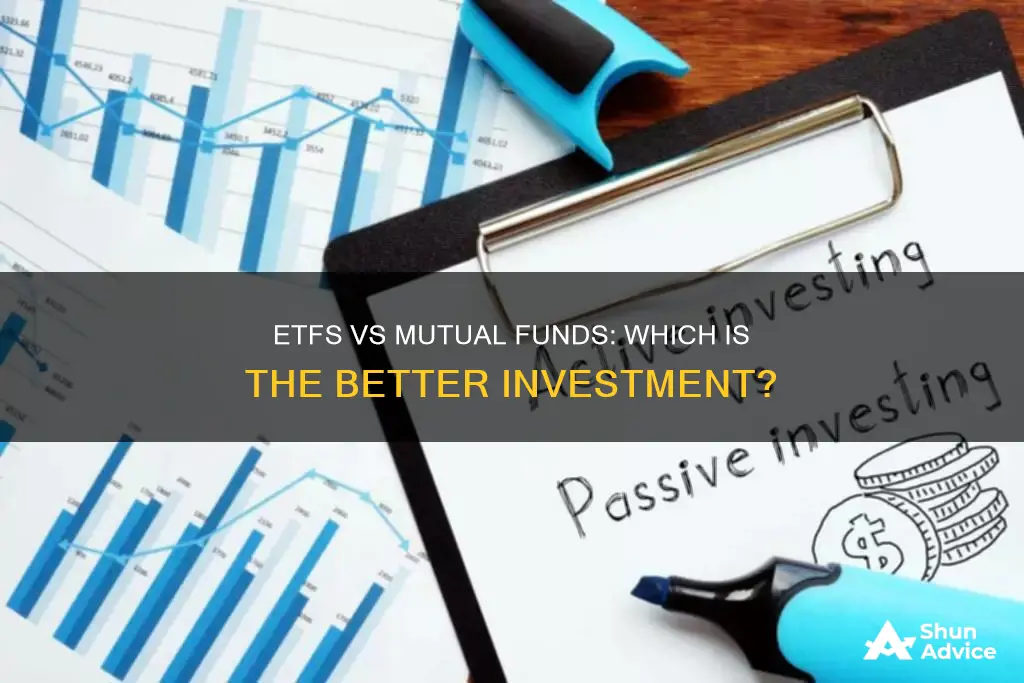
Exchange-traded funds (ETFs) and mutual funds are two popular investment vehicles that allow investors to diversify their portfolios. While both funds offer instant diversification and professional management of fund assets, there are some key differences between the two. ETFs are typically passively managed, tracking a market index or sector sub-index, while mutual funds are usually actively managed, with fund managers making decisions about how to allocate assets. ETFs are traded intra-day on an exchange like stocks, offering more flexibility to investors, whereas mutual funds can only be bought and sold once a day at the end of the trading day. ETFs often have lower fees and expense ratios than mutual funds, as active management tends to result in higher costs. However, the choice between the two depends on various factors, including an investor's financial goals, risk tolerance, and investment style.
| Characteristics | Values |
|---|---|
| Initial Investment | ETFs: As little as the cost of one share. |
| Mutual Funds: Minimum initial investment of hundreds or thousands of dollars. | |
| Trading | ETFs: Can be bought and sold on an exchange throughout the trading day. |
| Mutual Funds: Can only be bought or sold once a day at the latest closing price. | |
| Management | ETFs: Usually passively managed, tracking a market index or sector sub-index. |
| Mutual Funds: Usually actively managed, attempting to beat the market. | |
| Costs | ETFs: Lower expense ratios. |
| Mutual Funds: Higher expense ratios. | |
| Taxes | ETFs: More tax-efficient. |
| Mutual Funds: Less tax-efficient. |
What You'll Learn

ETFs are more tax-efficient
Secondly, the creation and redemption process of ETFs also contributes to their tax efficiency. When an investor wants to redeem (sell) ETF shares, they are offered in-kind redemptions, meaning they receive a basket of the underlying securities instead of cash. This delays the realization of capital gains and provides the investor with more control over the timing of their tax payments.
Additionally, ETFs, due to their passive nature, tend to have lower expense ratios than actively managed mutual funds. Lower expense ratios mean lower fees, which translates into higher investment returns and, ultimately, a reduced tax burden for investors.
Furthermore, ETFs are traded on exchanges, and their prices are continuously determined by market forces. This real-time pricing allows investors to make more informed decisions and react swiftly to market changes, potentially reducing their tax liability.
Lastly, ETFs do not have a minimum holding period, providing investors with greater flexibility. This is particularly advantageous when tracking international assets, where the ETF's price can reflect the latest market valuation, even if the U.S. market has yet to update its pricing.
In summary, ETFs are more tax-efficient than mutual funds due to their passive management style, creation and redemption process, lower expense ratios, real-time pricing, and lack of a minimum holding period. These factors combine to reduce the number of taxable events and provide investors with greater control over their tax obligations.
Mutual Fund Strategies: Deposits and Investments Timeline
You may want to see also

Mutual funds offer active management
Actively managed funds aim to beat their benchmark and may charge higher expenses than passively managed funds. These higher costs are due to the substantial time, effort, and manpower required for securities research and analysis. Actively managed funds tend to have higher fees and higher expense ratios due to their higher operations and trading costs.
Mutual funds are usually actively managed, and this active management can benefit investors by providing them with professional managers who try to achieve the stated investment goals of the fund. The fund managers charge a fee, known as an expense ratio, in exchange for managing the fund.
However, it is important to note that while active management can provide potential benefits, it also comes with potential downsides. Actively managed funds tend to be more expensive than passively managed funds, and they may not always outperform the market. Additionally, active management can result in higher taxes for investors due to the capital gains generated as the fund manager buys and sells securities.
Overall, while mutual funds offer active management, it is important to carefully consider the potential benefits and drawbacks before investing.
Corporate Money: Investing in Vanguard Index Funds
You may want to see also

ETFs are more liquid
ETFs (exchange-traded funds) are traded on exchanges like stocks, meaning they can be bought and sold throughout the day. This is in contrast to mutual funds, which can only be bought and sold once a day at the latest closing price. This makes ETFs more liquid than mutual funds.
Advantages of ETFs
ETFs are often chosen over mutual funds because they are more flexible and convenient. ETFs can be traded whenever you want, rather than just once a day. This means you can turn your investment back into cash quickly if you need to. ETFs are also often cheaper than mutual funds, with lower expense ratios.
Disadvantages of ETFs
ETFs may not be suitable for investors who want to beat the market. As passive investments, ETFs aim to match the performance of a particular index rather than outperform it. Investors seeking higher returns may prefer the active management of mutual funds.
Whether you choose to invest in ETFs or mutual funds depends on your financial goals, risk tolerance, and investment style. If you want instant diversification, flexibility, and low fees, ETFs could be the better option. However, if you're willing to pay higher fees for the potential of higher returns, you may prefer mutual funds.
Systematic Transfer Plans: Investing in Volatile Markets with Mutual Funds
You may want to see also

Mutual funds have higher fees
Actively managed funds have higher fees and expense ratios because of their higher operations and trading costs. The costs of analysts, economic and industry research, company visits, and administration are passed on to investors.
Mutual funds also have higher minimum investment requirements than ETFs. While ETFs can be purchased for the cost of a single share, mutual funds often have minimum investments of hundreds or thousands of dollars.
However, it is worth noting that the difference in fees between mutual funds and ETFs has narrowed in recent years as mutual funds work to attract new investors. Additionally, some mutual funds are passively managed, which can be cheaper than actively managed ETFs.
Maximizing Returns: Managed Funds for Long-Term Investment Strategies
You may want to see also

Mutual funds have higher expense ratios
Mutual funds and exchange-traded funds (ETFs) are popular investment vehicles that allow investors to diversify their portfolios. While both have their advantages, mutual funds tend to have higher expense ratios for several reasons.
Firstly, mutual funds often have higher fees because they are actively managed. This means that fund managers attempt to beat the market by actively picking stocks, conducting research, and trading more frequently. These activities incur higher operating costs, which are passed on to investors through higher expense ratios. In contrast, ETFs are typically passively managed, tracking a market index, and thus have lower fees.
Secondly, mutual funds usually have minimum investment requirements, which can range from $500 to $5,000 or more. This means that investors must commit a substantial sum upfront, contributing to the higher costs associated with mutual funds. On the other hand, ETFs can be purchased for the price of a single share, making them more accessible to a wider range of investors.
Additionally, mutual funds often charge sales commissions, also known as loads, which can further increase the overall cost of investing in mutual funds. These commissions are typically absent in ETFs, making them a more cost-effective option for many investors.
Furthermore, the structure of mutual funds can also lead to higher taxes for investors. Actively managed mutual funds tend to generate more capital gains due to frequent trading, and these gains are passed on to investors as taxable distributions. In contrast, ETFs, with their passive management strategy, tend to have lower turnover and fewer transactions, resulting in fewer taxable events for investors.
Finally, the way mutual funds are priced can also impact their expense ratios. Mutual funds are priced only at the end of each trading day, whereas ETFs are traded throughout the day on exchanges, allowing investors to take advantage of real-time pricing and potentially benefit from more favourable prices.
In summary, while both mutual funds and ETFs offer benefits to investors, mutual funds tend to have higher expense ratios due to active management, higher minimum investments, sales commissions, tax implications, and pricing structures.
Index Fund Investing: A Beginner's Guide to Getting Started
You may want to see also
Frequently asked questions
ETFs can be traded throughout the day on an exchange like stocks, whereas mutual funds can only be bought or sold once a day after the market closes.
Both ETFs and mutual funds are suitable for beginners. ETFs may be more straightforward since they are often passively managed and require less active decision-making. Mutual funds can be a good option for beginners who want a more hands-off approach and are willing to pay higher fees for active management.
The safety of an investment depends on the underlying holdings, not the structure. Both ETFs and mutual funds can be safe investments when properly diversified and managed.
ETFs are generally considered more tax-efficient due to their passive management style, which results in fewer taxable events. However, mutual funds held in tax-advantaged accounts can also minimize tax implications.
There is no definitive answer as it depends on various factors, including the fund's performance, fees, and investment strategy. However, ETFs tend to have lower expense ratios, which can result in higher returns over time.







